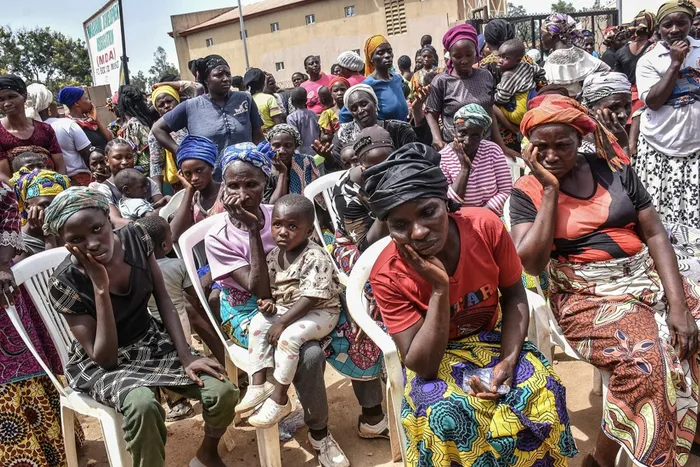Rising tide of corruption amid humanitarian crises

Picture: AFP / Taken on May 20, 2023 – Nigerian internal displaced persons at a temporary shelter in Mangu, near Jos in the Plateau State in Nigeria. More than 100 people in central Nigeria have died in several days of intercommunal violence that have destroyed hundreds of homes and caused thousands to flee, local officials said on Friday.
Picture: Armand Hough / African News Agency (ANA) / Taken on September 28, 2023 – Franschhoek, near Cape Town, South Africa, measures a record 299mm of rainfall during the Western Cape storm. The Cape Winelands has suffered R800 million in damage, the Garden Route R82 million, and the Overberg R520 million. Natural disasters come with devastating consequences for human habitats and living conditions, the writer says.
By Omololu Fagbadebo
Recent natural disasters have plunged some African countries into deep humanitarian crises. In Libya, for instance, last month’s tropical storm, Daniel, left more than 3,958 dead while an estimated 9,000 people were missing, with massive destruction of infrastructural facilities and residential houses.
In its 2022 report on unreported humanitarian crisis spots in Africa, Care International presented staggering documentation on the parlous state of human living conditions in some African countries. A common discovery is the paradox of suffering and pain amid abundant natural resources. Natural disasters occur on all continents of the world. Earthquakes, floods, violent storms, droughts and fire incidents, among other natural occurrences, usually come with devastating consequences for human habitats and living conditions.
Aside from natural disasters, the dynamic internal developments often engender humanitarian crises across the world, especially in developing countries. Civil wars, inter-ethnic crises and conflicts, and warped economic developments, among others, are the most common sources of humanitarian crises, most especially in developing countries, including Africa, even though most of the occurrences are not limited to African countries. Nevertheless, the management of their consequences speaks much about the preparedness of the government of each country.

In Africa, the humanitarian crisis challenge has remained a concern. While humanitarian crises are not limited to Africa, the management of the consequences has been short of best practices, thereby complicating and aggravating the suffering. In Africa, the major sources of humanitarian crises are the consequences of political developments such as civil wars, ethnic violence and wars, political instability and, more recently, insurgencies. The consequence of these is the massive displacement of citizens, occasioned by unending insecurity and hunger.
Refugee camps and internally displaced people centres are common on the Continent. Last year, there were more than 26 million internally displaced people in Africa, with an estimated eight million refugees. The development has sparked a crisis of governance that affected the living conditions of citizens.
In Angola, 3.8 million people live in hunger because there is insufficient food. The figure is 4.4 million in Niger. In Zambia, 50 percent of citizens live in poverty, surviving on $1.90 (R37) a day. Chad is the second country with the highest maternal mortality rate globally, while Mali has the eighth highest child mortality rate. In Cameroon, more than 3.9 million people need humanitarian assistance. In Central African Republic (CAR), the figure is 3.1 million and in Zimbabwe, seven million. In Malawi, 37 percent of children are malnourished. In Burundi, the figure is 50 percent.
According to the UN Population Fund, in Djibouti, Eritrea, Ethiopia, Kenya and Somalia, more than 60 million people need humanitarian assistance, with more than 32 million suffering from food insecurity. The continuing violence in Sudan has led to the displacement of more than five million people, while more than half of the population needs humanitarian intervention. The International Organisation for Migration says more than 24.7 million people in Sudan need protection and humanitarian assistance, with more than a million citizens fleeing to neighbouring countries.
The war in Ukraine and the excruciating consequences of climate change have contributed to the governance challenges, compounding the scourge of humanitarian crises in Africa. This is sad. The crises have implications on the Continent and require concerted efforts to ameliorate the consequences for human security.
For instance, the UN High Commissioner for Refugees solicited assistance of $1bn to provide essential assistance materials for the increasing refugees in the Sudan crisis. The UN Office for the Co-ordination of Humanitarian Affairs has indicated the need for more than $6.7bn for its humanitarian response plans in eight countries in west Africa.
The Continent is not prepared for this kind of financial burden. The AU, the continental body, cannot handle the deluge of humanitarian crises emanating from the series of violence and disasters on the Continent. As usual, the AU and the governments of the affected countries depend on assistance from international donor agencies.
Sadly, most of the financial and material support is mismanaged. For instance, the scandals that trailed the financial assistance released to Ebola-ravaged west African countries in 2014 were monumental. The corruption that characterised the management of the Covid-19 pandemic in Africa was staggering. In some cases, the corruption pandemic was more severe and devastating than Covid-19 itself.
The AU Convention on Preventing and Combating Corruption was adopted on July 1, 2003, in Maputo and became effective on August 5, 2006. For more than 17 years, the convention has remained dormant as corruption thrives on the Continent, with impunity.
Behind the deluge of humanitarian crises on the Continent is the rising tide of systematic corruption that defines governance in Africa. This is a challenge that requires more than rhetoric. It requires the political will to actualise requisite anti-corruption statutes to stem the tide of the crisis of governance in Africa.
Omololu Fagbadebo is based in the Department of Public Management, Law and Economics at the Durban University of Technology